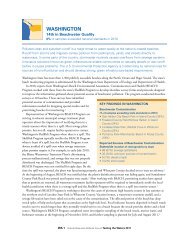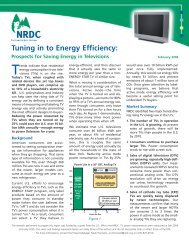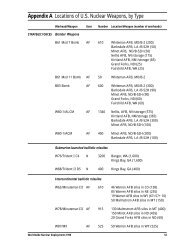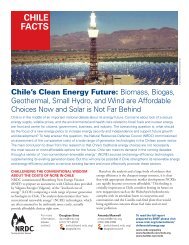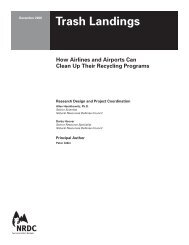US Nuclear Weapons in Europe - Natural Resources Defense Council
US Nuclear Weapons in Europe - Natural Resources Defense Council
US Nuclear Weapons in Europe - Natural Resources Defense Council
Create successful ePaper yourself
Turn your PDF publications into a flip-book with our unique Google optimized e-Paper software.
U.S. <strong>Nuclear</strong> <strong>Weapons</strong> <strong>in</strong> <strong>Europe</strong> • Hans M. Kristensen/<strong>Natural</strong> <strong>Resources</strong> <strong>Defense</strong> <strong>Council</strong>, 2005<br />
F<strong>in</strong>ally, there is the question of burden shar<strong>in</strong>g and whether this long-held pr<strong>in</strong>ciple of<br />
NATO nuclear plann<strong>in</strong>g is erod<strong>in</strong>g. Although a third of the U.S. forward-deployed<br />
nuclear bombs <strong>in</strong> <strong>Europe</strong> are earmarked for deliver by half a dozen non-nuclear NATO<br />
countries, many of those countries are show<strong>in</strong>g signs of retreat<strong>in</strong>g from of the nuclear<br />
mission. <strong>Nuclear</strong> weapons were removed from Greece <strong>in</strong> 2001, Italy only has nuclear<br />
weapons on one national air base, Germany also only has nuclear weapons left on one<br />
national air base and closed another base <strong>in</strong> 2003. And Germany may phase out its<br />
nuclear mission altogether with its planned replacement of the Tornado aircraft with the<br />
Eurofighter <strong>in</strong> the next decade.<br />
Turkey no longer stores nuclear weapons on its national air bases, and the Turkish<br />
government has made decisions dur<strong>in</strong>g the last couple of years that strongly call <strong>in</strong>to<br />
question the credibility of nuclear operations from Turkey territory. Dur<strong>in</strong>g the 2003 war<br />
aga<strong>in</strong>st Iraq, Turkey refused to give the United States permission to move major ground<br />
forces through Turkey <strong>in</strong>to northern Iraq. And as recently as <strong>in</strong> December 2004, the<br />
Turkish government announced that it would “not back any U.S. military action on<br />
Iran.” 230 NATO’s nuclear posture <strong>in</strong> <strong>Europe</strong> is partially justified as a potential deterrent<br />
aga<strong>in</strong>st proliferat<strong>in</strong>g countries, and Incirlik Air Base <strong>in</strong> Turkey is the only NATO nuclear<br />
air base with<strong>in</strong> strik<strong>in</strong>g range of Iran. The credibility of that deterrent – even if one<br />
believes it existed – seems to have eroded with Turkey’s stand.<br />
In conclusion, a f<strong>in</strong>al review of the forward deployment of U.S. nuclear weapons <strong>in</strong><br />
<strong>Europe</strong> is long overdue. This time, the U.S. Congress and <strong>Europe</strong>an parliaments must<br />
ask tough questions about the rationale for the deployment. They should not be content<br />
with vague justifications from the past about nuclear weapons “prevent<strong>in</strong>g war” or<br />
“provid<strong>in</strong>g a political l<strong>in</strong>k between <strong>Europe</strong> and North America.” The focus must be on<br />
exactly who the enemy is and where the targets are for these weapons, which essential<br />
and unique benefits the weapons provide to NATO’s security that cannot be met through<br />
other means, and how the tra<strong>in</strong><strong>in</strong>g <strong>in</strong> peacetime of pilots from non-nuclear countries to<br />
deliver nuclear weapons <strong>in</strong> wartime matches <strong>Europe</strong>an and U.S. nonproliferation<br />
messages.<br />
74



